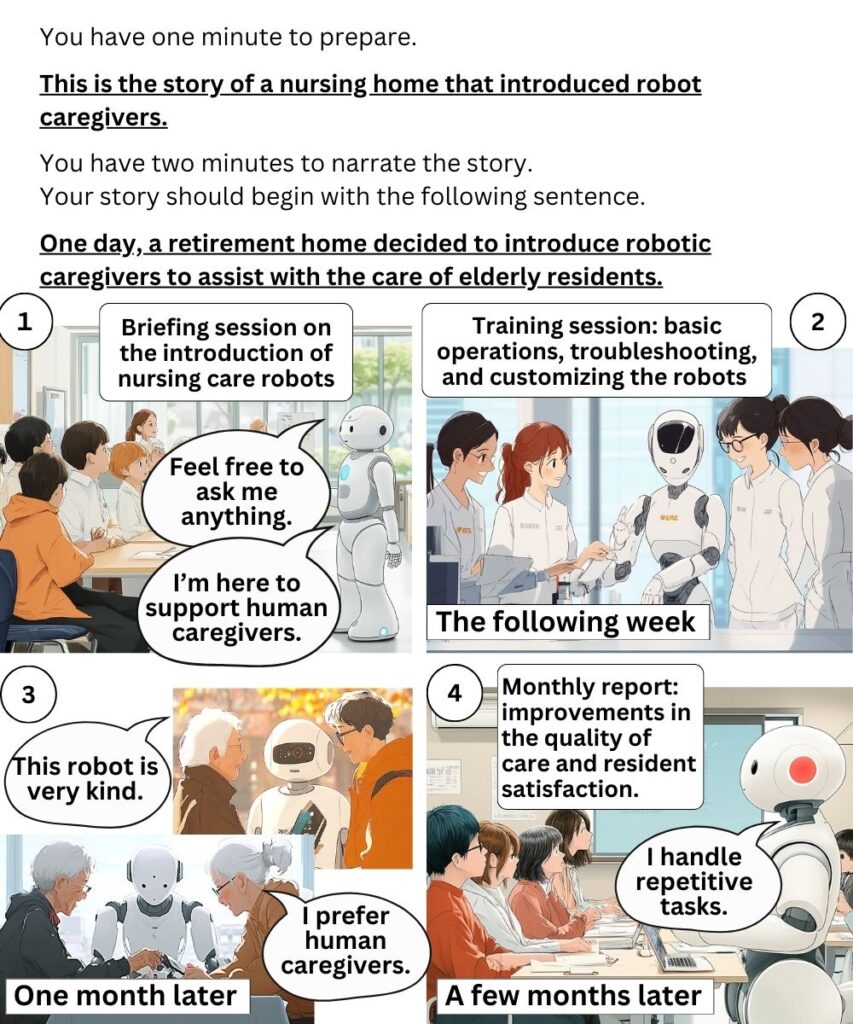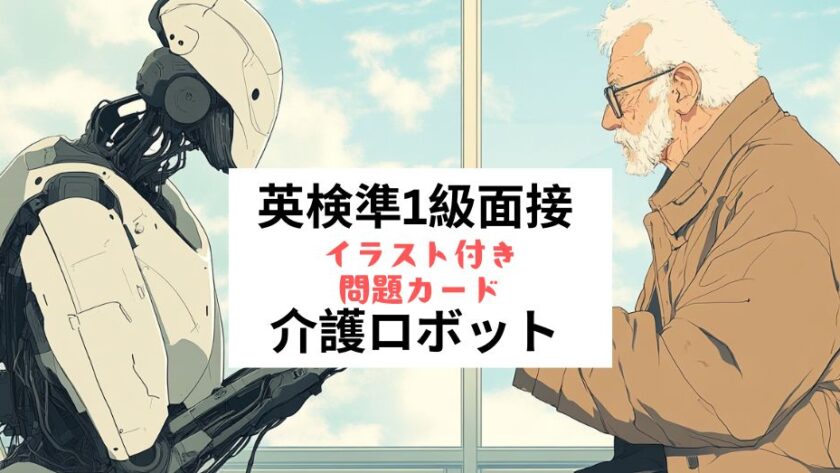実際の出題形式(問題カード)で英検準1級の面接練習を独学できるページです。
2024年度リニューアル対応!
所要時間:概ね8分
質問概要
ナレーション内容を考える(1分間)
イラストの内容を説明するナレーションを考える
ナレーション(2分間):ナレーションを始める
※2分以上続く場合は、途中でも中止させられるので注意
Q&A(No. 1):イラスト関連の質問
イラストに関連した質問。「問題カード」を見ながら解答できます。
※登場人物が考えている事などを聞かれます。
Q&A(No.2, No. 3)
問題カードに関連した、受験者の意見を問う質問
Q&A(No. 4)
問題カードのトピックに少し関係のある質問。受験者の意見を問う質問
※この<No. 4>質問文に「導入文」が追加されました。
問題カード

ナレーションと質問
ナレーション指示
<指示>Look at the pictures carefully and read the directions silently for one minute.(1分間)
<指示>Now, please begin your narration.(2分間)
Question No.1
Please look at the third picture. If you were one of the hesitant residents, what would you be thinking?
Question No.2
Do you believe that robotic caregivers are beneficial for elderly care?
Question No. 3
Do you think that technology like robotic caregivers will become more common in the future?
Question No.4
Some people say that AI-powered robot caregivers will be better. Do you think human caregivers will be less important in the future of elderly care?
質問音源チャレンジ
本番のように、英語の質問を聞いて答える練習をしてみましょう。
ナレーション準備
ナレーション開始
Question 1 mp3
Question 2 mp3
Question 3 mp3
Question 4 mp3
解答例
ナレーション例
<1> One day, a retirement home decided to introduce robotic caregivers to assist with the care of elderly residents. During a briefing session, a friendly robot explained that it would support, not replace, human caregivers. Residents were encouraged to ask questions to ensure everyone felt comfortable with the new technology.
ある日、老人ホームは高齢者のケアを支援するためにロボット介護士を導入することを決定した。説明会ではフレンドリーなロボットが、人間の介護士に取って代わるものではなく、サポートするものだと説明した。入居者全員が新しい技術に安心できるように、質問するよう促された。
<2> The following week, the staff attended training sessions on how to operate the robots. They learned basic operations, troubleshooting, and how to customize the robots to meet individual residents’ needs. The goal was to ensure that the staff could confidently integrate the robots into daily routines.
翌週、スタッフはロボットの操作方法についてのトレーニングを受けた。基本操作、トラブルシューティング、入居者のニーズに応じたカスタマイズ方法を学び、日常業務に自信を持って取り入れられるようにした
今回、「日常業務 = daily routines」としていますが、他の言い方も押さえておこう!
1. everyday tasks
2. regular duties
3. daily operations
4. daily tasks
5. routine tasks
6. day-to-day activities
7. workday activities
8. habitual tasks
9. standard procedures
10. normal operations
<3> One month later, residents began interacting with the robotic caregivers. Some quickly embraced the robots, finding them kind and helpful, while others were hesitant and preferred human caregivers. The staff provided ongoing support to help everyone adjust to the new additions.
1か月後、入居者たちはロボット介護士と交流を始めた。ロボットは親切で役に立つと感じてすぐに受け入れた人もいたが、躊躇して人間の介護者を好む人もいた。スタッフは皆が新しいロボットに慣れるようサポートを続けた
<4> A few months later, the retirement home observed significant improvements in care quality and resident satisfaction. The robots efficiently handled repetitive tasks, allowing human caregivers to focus more on personal interactions. This balance led to higher resident satisfaction, confirming that introducing robotic caregivers was a positive decision. (180 words)
数か月後、老人ホームはケアの質と入居者の満足度が向上したことを確認した。ロボットが反復作業をこなし、人間の介護士は個別の交流に集中できるようになった。このバランスにより、入居者の満足度が向上し、ロボット介護士の導入が成功したことが確認された
ロボットは「repetitive tasks 反復作業」の他にも得意なタスクを増やしているね。
1. data entry – データ入力
2. assembly line work – 組み立てライン作業
3. quality control – 品質管理
4. inventory management – 在庫管理
5. sorting – 仕分け
6. welding – 溶接
7. packing – 梱包
8. cleaning – 掃除
9. transportation – 輸送
10. inspection – 検査
Question 1 解答例
質問:3枚目の写真を見てください。もしあなたが躊躇(ちゅうちょ)している入居者の一人だったら、何を思うでしょうか?
If I were one of the hesitant residents, I would be thinking about whether the robot could truly understand my needs and concerns as well as a human caregiver. I might also worry about losing the personal connection I have with the human staff, which is important to me.
もし私が躊躇(ちゅうちょ)している入居者の一人だったら、ロボットが人間の介護士と同じように私のニーズや懸念を理解できるかどうかを考えるでしょう。また、私にとって重要な人間スタッフとの個人的なつながりを失うことを心配するかもしれません。
「hesitant(躊躇している)residents」について尋ねられているので、ロボットに対する不安や疑念を示す答えが求められるね
Question 2 解答例
介護ロボットは高齢者介護に有益だと思いますか?
Yes, I believe robotic caregivers are beneficial for elderly care. They can handle routine tasks efficiently, allowing human caregivers to focus more on providing emotional support and personal care to the residents.
はい、ロボット介護士は高齢者ケアにとって有益だと思います。ロボットは日常の業務を効率的に処理できるため、人間の介護士は入居者に対してより多くの感情的支援や個別ケアを提供できるようになります。
No, I believe that robotic caregivers might create a cold and impersonal environment. Elderly care requires a human touch, and relying too much on robots might lead to a lack of genuine human interaction.
いいえ、ロボット介護士は冷たく無機質な環境を生む可能性があると思います。高齢者ケアには人間的な触れ合いが必要であり、ロボットに過度に依存すると、本物の人間との交流が不足してしまうかもしれません。
Question 3 解答例
将来、介護ロボットのような技術が普及すると思いますか?
Yes, I think technology like robotic caregivers will become more common in the future as the demand for elderly care increases and technology continues to advance. Robots can help alleviate the burden on human caregivers and ensure that elderly people receive consistent care.
はい、ロボット介護士のような技術は将来的にもっと一般的になると思います。高齢者ケアの需要が増加し、技術が進歩し続ける中で、ロボットは人間の介護士の負担を軽減し、高齢者が一貫したケアを受けられるようにすることができるからです
Question 4 解答例
AI 搭載のロボット介護士のほうが優れているという人もいます。高齢者介護の将来において、人間の介護士の重要性は低下すると思いますか?
Yes, as robotic caregivers become more advanced and capable of performing various tasks, the role of human caregivers may become less critical. Robots could take over routine duties, reducing the need for as many human caregivers.
はい、ロボット介護士がさらに進化し、さまざまな業務をこなせるようになるにつれて、人間の介護士の役割はそれほど重要ではなくなるかもしれません。ロボットが日常の業務を引き継ぐことで、人間の介護士の数が減る可能性があります
No, I don’t believe human caregivers will become less important. While robots can handle repetitive tasks, human caregivers provide the emotional connection and personalized care that are essential for the well-being of elderly residents.
いいえ、人間の介護士がそれほど重要でなくなるとは思いません。ロボットは反復的な作業をこなすことができますが、人間の介護士は高齢者の居住者の幸福のために欠かせない感情的なつながりや個別のケアを提供します
面接練習はask本校にお尋ねください:無料体験レッスン予約
こちらの投稿もおススメです:英検準1級面接対策|AIとビジネスに関する最新問題カードつき
介護ロボットジョーク
1. 英語:
Why did the caregiver robot take up painting?
Because it was tired of drawing the line at helping people!
日本語訳:
介護ロボットがなぜ絵を描き始めたのか?
それは、人助けに限界を感じたからだよ!
解説:
「drawing the line」という表現は、直訳すると「線を引く」という意味ですが、比喩的に「限界を設ける」「ここまでと決める」という意味もあります。このジョークは、介護ロボットが「人助けに限界を感じた」と、絵を描く方に転向したというユーモラスな設定です。
2. 英語:
What did the caregiver robot say to the elderly patient who asked for a joke?
“Sorry, I’m programmed to care, not to be funny.”
日本語訳:
お年寄りの患者さんがジョークを求めたとき、介護ロボットは何と言ったか?
「申し訳ありません、私はお世話をするようにプログラムされていますが、面白くするようにはプログラムされていません。」
解説:
このジョークは、ロボットが感情やユーモアを持たないという一般的な認識を元にしています。ロボットが「お世話する」ことにはプログラムされているが、「面白くする」ことはできないというのがオチです。
3. 英語:
Why don’t caregiver robots get stressed?
Because they always have a perfect recharge plan!
日本語訳:
介護ロボットがストレスを感じないのはなぜか?
それは、いつも完璧な充電プランがあるからだよ!
解説:
「recharge plan(充電プラン)」は、ロボットがバッテリーを充電することにかけた言葉遊びです。人間はストレスを感じることがありますが、ロボットは充電さえできればストレスフリーで動き続ける、というユーモラスな考えです。
4. 英語:
How does a caregiver robot apologize?
It says, “My circuits got crossed. Let me assist you properly this time.”
日本語訳:
介護ロボットはどのように謝るのか?
「回路が交差してしまいました。今度こそちゃんとお手伝いさせてください。」
解説:
「circuits got crossed(回路が交差した)」は、ロボットが誤作動したり混乱したりすることを表現しています。このジョークでは、ロボットが謝罪する際に「回路の混乱」を理由にし、次は正しく助けると約束するというオチです。




